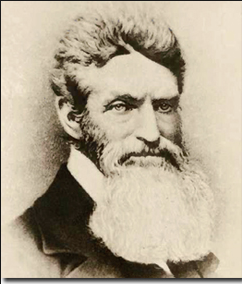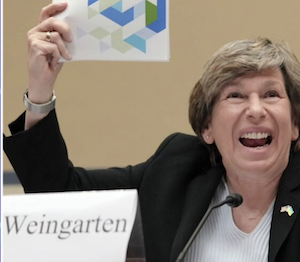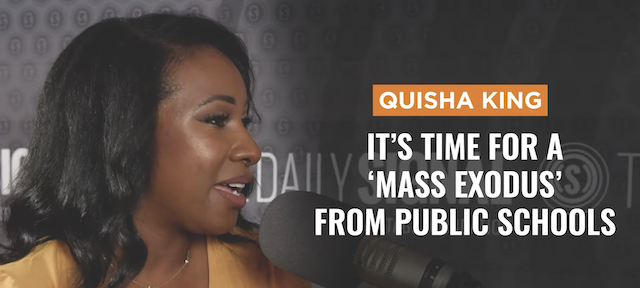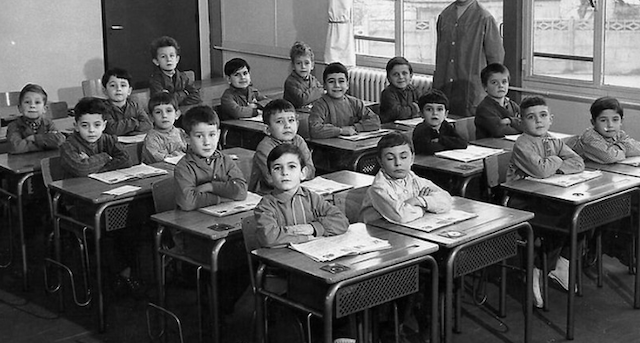One of the founders of Moms for Liberty is blaming the infiltration of critical theory into America’s classrooms for the existence of what she considers discriminatory and divisive disciplinary policies.
 Public schools in Portland, Oregon, must take certain things into account when they discipline students. Portland Public Schools will now require staff to consider the race, gender identity, and sexual orientation when disciplining a student who gets in trouble.
Public schools in Portland, Oregon, must take certain things into account when they discipline students. Portland Public Schools will now require staff to consider the race, gender identity, and sexual orientation when disciplining a student who gets in trouble.
Fox reports this policy is the result of a collective bargaining agreement between Portland Public Schools and its teachers. The policy says the superintendent or designee will review disciplinary disparities apparent by the race, gender, special education status, etc. Now, repeated disruptive behavior from a student will get addressed with a “support plan.” Continue reading



 We moved to a good school district. The area was growing. Built for families like ours, all of the public schools in the area received “A” or “8/10” ratings. There were two very expensive and very fancy private schools in the area. It was an idyllic place to raise children.
We moved to a good school district. The area was growing. Built for families like ours, all of the public schools in the area received “A” or “8/10” ratings. There were two very expensive and very fancy private schools in the area. It was an idyllic place to raise children. A mom who refuses to put her kids in school has revealed that she lets her baby play in and eat mud to help build a healthy immune system.
A mom who refuses to put her kids in school has revealed that she lets her baby play in and eat mud to help build a healthy immune system. Former first lady Rosalynn Carter died Nov. 19 at 96 years old with husband, former President Jimmy Carter, who turned 99 last month, by her side at their home in Georgia, their son told The Washington Post.
Former first lady Rosalynn Carter died Nov. 19 at 96 years old with husband, former President Jimmy Carter, who turned 99 last month, by her side at their home in Georgia, their son told The Washington Post. As the founder and CEO of As the founder and CEO of
As the founder and CEO of As the founder and CEO of 
 More than three years after Covid-19 began, explanations abound for ongoing “learning loss” in schools. But these discussions often miss one of the most obvious explanations: outdated and ineffective instruction.
More than three years after Covid-19 began, explanations abound for ongoing “learning loss” in schools. But these discussions often miss one of the most obvious explanations: outdated and ineffective instruction. American Federation of Teachers President Randi Weingarten got more than she asked for after she posted an article about the rise in homeschooling in America on social media Sunday.
American Federation of Teachers President Randi Weingarten got more than she asked for after she posted an article about the rise in homeschooling in America on social media Sunday. As a student, I was a whiz at memorization, so much so, that I remember basically memorizing two lead roles for different plays – one at age 13 and one at age 16 – after only one serious and focused read-through of the scripts. As an adult, I see myself mirroring my mother’s shock at such a feat, but at the time, such ease in memorization was simply second nature.
As a student, I was a whiz at memorization, so much so, that I remember basically memorizing two lead roles for different plays – one at age 13 and one at age 16 – after only one serious and focused read-through of the scripts. As an adult, I see myself mirroring my mother’s shock at such a feat, but at the time, such ease in memorization was simply second nature. In Maryland, a group seeks to have sexually explicit books removed from school libraries and is being portrayed as enemies of speech and enlightenment. Meanwhile, in California, parents believe they should be informed if their child shows signs of gender confusion while at school – an argument with which the state disagrees.
In Maryland, a group seeks to have sexually explicit books removed from school libraries and is being portrayed as enemies of speech and enlightenment. Meanwhile, in California, parents believe they should be informed if their child shows signs of gender confusion while at school – an argument with which the state disagrees. 
 It seems like the public schools in Hillsborough County, Florida have been having problems similar to those experienced in Kanawha County, West Virginia public schools 49 years ago now. Considering the true agenda of the public education system in this country – indoctrination rather than education – should anyone really be surprised?
It seems like the public schools in Hillsborough County, Florida have been having problems similar to those experienced in Kanawha County, West Virginia public schools 49 years ago now. Considering the true agenda of the public education system in this country – indoctrination rather than education – should anyone really be surprised? Movie music is the subtle cue that tells you how to respond to a certain scene. Happy, sad, afraid, angry – you name the mood and the composer will ensure that the desired emotion is accomplished.
Movie music is the subtle cue that tells you how to respond to a certain scene. Happy, sad, afraid, angry – you name the mood and the composer will ensure that the desired emotion is accomplished. As a grade school student, one of my favorite field trips was spending a day attending the one-room school at a local historical site. My friends and I would pack our noontime meal in lunch buckets, dress in aprons and bonnets, and participate in a spelling bee at the close of the day.
As a grade school student, one of my favorite field trips was spending a day attending the one-room school at a local historical site. My friends and I would pack our noontime meal in lunch buckets, dress in aprons and bonnets, and participate in a spelling bee at the close of the day. Parents once looked forward to having their children reach the age of five. At that time, children enter kindergarten, usually a half-day session either in the morning or in the afternoon.
Parents once looked forward to having their children reach the age of five. At that time, children enter kindergarten, usually a half-day session either in the morning or in the afternoon. Those of us who have homeschooled for years are accustomed to periodic calls for greater regulation of homeschooling. Whether it’s a
Those of us who have homeschooled for years are accustomed to periodic calls for greater regulation of homeschooling. Whether it’s a  It’s no secret that academic outputs in schools across the nation are pretty abysmal. In fact, things have grown so bad that now it seems we’re praising schools that manage to achieve roughly 50% proficiency.
It’s no secret that academic outputs in schools across the nation are pretty abysmal. In fact, things have grown so bad that now it seems we’re praising schools that manage to achieve roughly 50% proficiency.